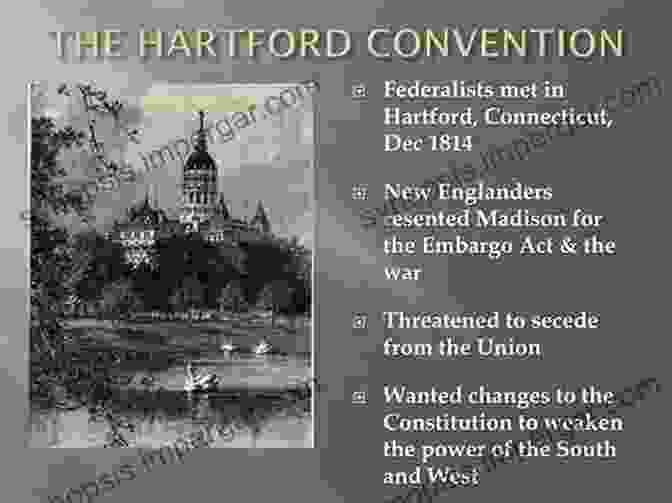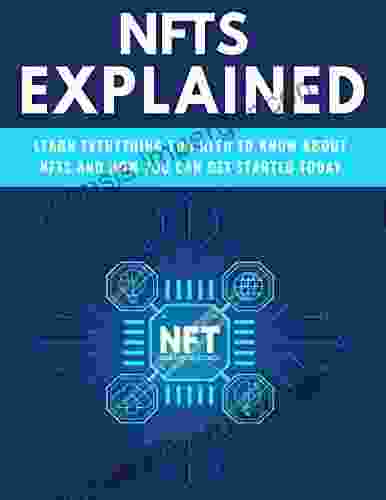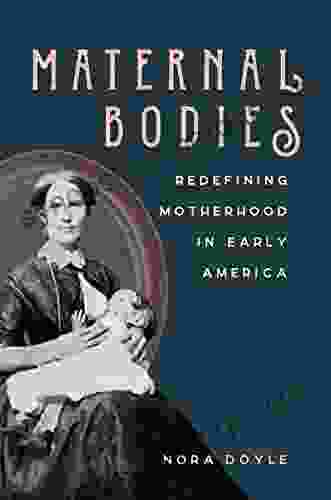The Hartford Convention: A Pivotal Moment in American History

4.4 out of 5
| Language | : | English |
| File size | : | 1894 KB |
| Text-to-Speech | : | Enabled |
| Screen Reader | : | Supported |
| Enhanced typesetting | : | Enabled |
| Word Wise | : | Enabled |
| Print length | : | 466 pages |
The Hartford Convention was a secret meeting of New England Federalists in Hartford, Connecticut, from December 15, 1814, to January 5, 1815, during the War of 1812. The convention was held to discuss the grievances of New Englanders against the national government, and to consider possible actions, including secession from the Union.
The convention was attended by 26 delegates from Massachusetts, Connecticut, Rhode Island, Vermont, and New Hampshire. The delegates were mostly Federalists, who were opposed to the war and to the policies of the Democratic-Republican administration of President James Madison.
The delegates to the Hartford Convention debated a wide range of issues, including the war, the national debt, the embargo on trade with Great Britain, and the admission of new states to the Union. They also discussed the possibility of secession from the Union, but ultimately decided against it.
The Hartford Convention issued a report that outlined their grievances against the national government. The report called for a number of changes, including a reduction in the size of the army and navy, a repeal of the embargo on trade with Great Britain, and a constitutional amendment that would require a two-thirds majority of Congress to declare war.
The report of the Hartford Convention was met with outrage by many Americans. The convention was denounced as a treasonous plot to destroy the Union. The Federalist Party was blamed for the convention, and the party's popularity declined rapidly.
The Hartford Convention was a significant event in American history. It marked the end of the Federalist Party as a major political force, and it helped to solidify the power of the Democratic-Republican Party.
The Causes of the Hartford Convention
There were a number of factors that contributed to the Hartford Convention. These included:
- The War of 1812
- The national debt
- The embargo on trade with Great Britain
- The admission of new states to the Union
The War of 1812 was a major cause of discontent in New England. New Englanders opposed the war because they believed it was unnecessary and because it was hurting their economy. The war also led to a sharp increase in the national debt, which New Englanders were forced to pay for.
The embargo on trade with Great Britain was another major grievance of New Englanders. The embargo was intended to pressure Great Britain to end its impressment of American sailors. However, the embargo also caused significant economic hardship in New England, where many people depended on trade with Great Britain for their livelihood.
The admission of new states to the Union was also a source of concern for New Englanders. New Englanders feared that the admission of new states would dilute their power in Congress. They also worried that the new states would be more likely to support the Democratic-Republican Party, which New Englanders opposed.
The Proceedings of the Hartford Convention
The Hartford Convention was held in secret. The delegates met in a private home in Hartford, Connecticut. The convention was presided over by George Cabot, a former Senator from Massachusetts.
The delegates to the Hartford Convention debated a wide range of issues. These included:
- The war
- The national debt
- The embargo on trade with Great Britain
- The admission of new states to the Union
The delegates also discussed the possibility of secession from the Union. However, ultimately they decided against it.
The Hartford Convention issued a report that outlined their grievances against the national government. The report called for a number of changes, including a reduction in the size of the army and navy, a repeal of the embargo on trade with Great Britain, and a constitutional amendment that would require a two-thirds majority of Congress to declare war.
The Aftermath of the Hartford Convention
The report of the Hartford Convention was met with outrage by many Americans. The convention was denounced as a treasonous plot to destroy the Union. The Federalist Party was blamed for the convention, and the party's popularity declined rapidly.
The Hartford Convention was a significant event in American history. It marked the end of the Federalist Party as a major political force, and it helped to solidify the power of the Democratic-Republican Party.
The Hartford Convention was a pivotal moment in American history. It marked the end of the Federalist Party as a major political force, and it helped to solidify the power of the Democratic-Republican Party. The convention also played a role in the development of American federalism, and it helped to define the relationship between the states and the national government.

4.4 out of 5
| Language | : | English |
| File size | : | 1894 KB |
| Text-to-Speech | : | Enabled |
| Screen Reader | : | Supported |
| Enhanced typesetting | : | Enabled |
| Word Wise | : | Enabled |
| Print length | : | 466 pages |
Do you want to contribute by writing guest posts on this blog?
Please contact us and send us a resume of previous articles that you have written.
 Book
Book Novel
Novel Page
Page Chapter
Chapter Text
Text Story
Story Genre
Genre Reader
Reader Library
Library Paperback
Paperback E-book
E-book Magazine
Magazine Newspaper
Newspaper Paragraph
Paragraph Sentence
Sentence Bookmark
Bookmark Shelf
Shelf Glossary
Glossary Bibliography
Bibliography Foreword
Foreword Preface
Preface Synopsis
Synopsis Annotation
Annotation Footnote
Footnote Manuscript
Manuscript Scroll
Scroll Codex
Codex Tome
Tome Bestseller
Bestseller Classics
Classics Library card
Library card Narrative
Narrative Biography
Biography Autobiography
Autobiography Memoir
Memoir Reference
Reference Encyclopedia
Encyclopedia David M Shaw
David M Shaw Dawn Bohulano Mabalon
Dawn Bohulano Mabalon David Mccandless
David Mccandless David R Shaffer
David R Shaffer Mark Lane
Mark Lane Shelly Jo Spinden Wahlstrom
Shelly Jo Spinden Wahlstrom Randall Mcmullan
Randall Mcmullan Dennis Kengo Oka
Dennis Kengo Oka Stephen A Mitchell
Stephen A Mitchell Davide Mauri
Davide Mauri Patricia Wooster
Patricia Wooster Jeffrey J Selingo
Jeffrey J Selingo Neculai Andrei
Neculai Andrei David Richo
David Richo David Mackenzie
David Mackenzie Rhonda Baker
Rhonda Baker Deborah C Beidel
Deborah C Beidel Lisa M Cini
Lisa M Cini Diana Gabaldon
Diana Gabaldon David R Ashbaugh
David R Ashbaugh
Light bulbAdvertise smarter! Our strategic ad space ensures maximum exposure. Reserve your spot today!
 Deion SimmonsFollow ·18.2k
Deion SimmonsFollow ·18.2k Jedidiah HayesFollow ·14.8k
Jedidiah HayesFollow ·14.8k Joel MitchellFollow ·16.4k
Joel MitchellFollow ·16.4k Jeremy MitchellFollow ·15.7k
Jeremy MitchellFollow ·15.7k E.M. ForsterFollow ·17.1k
E.M. ForsterFollow ·17.1k Elliott CarterFollow ·11.2k
Elliott CarterFollow ·11.2k Jacques BellFollow ·13.2k
Jacques BellFollow ·13.2k Ralph Waldo EmersonFollow ·18.5k
Ralph Waldo EmersonFollow ·18.5k

 Ivan Turgenev
Ivan Turgenev38 Art Made During The Pandemic Digitally Enhanced Art...
By [Author's Name] The year 2024 was a time...

 F. Scott Fitzgerald
F. Scott FitzgeraldAmazing Cooking Guide To South Beach Diet: Your Culinary...
Embark on a...

 Zachary Cox
Zachary CoxGeneral History of Chinese Film: A Journey Through Time...
Origins and...

 Cristian Cox
Cristian CoxUnderstanding Antidepressants: An In-Depth Guide to...
Unleashing the Power of...

 Jeremy Cook
Jeremy CookUnlock the NFT Revolution: A Comprehensive Guide for...
The world of Non-Fungible Tokens (NFTs) has...

 Kevin Turner
Kevin TurnerSeneca and Roman Slavery Under Nero's Rule: An In-Depth...
During the reign of...
4.4 out of 5
| Language | : | English |
| File size | : | 1894 KB |
| Text-to-Speech | : | Enabled |
| Screen Reader | : | Supported |
| Enhanced typesetting | : | Enabled |
| Word Wise | : | Enabled |
| Print length | : | 466 pages |












